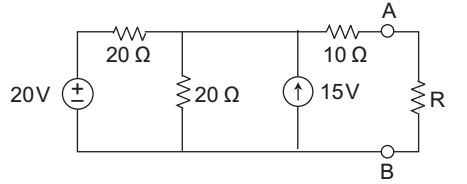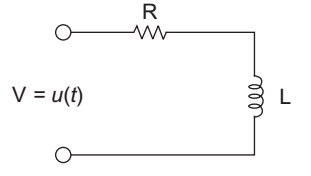Network Elements and the Concept of Circuit
- For the networks shown in the figures (a) and (b) to be duals, it is necessary that R′, L′ and C′ are respectively equal to—

-
View Hint View Answer Discuss in Forum
In order to make the dual network. simply replace voltage by current, current by voltage, inductance by capacitance resistance by conductance and capacitance by inductance.
From fig. (a)V = iR + L di + 1 ∫ i dt ......(i) dt C
from fig. (b)I = V′ G′ + C′ dV + 1 ∫ V´ dt ......(ii) dt L
On comparing equation (i) and (ii), we get
R = G′
L′ = C
C′ = LCorrect Option: A
In order to make the dual network. simply replace voltage by current, current by voltage, inductance by capacitance resistance by conductance and capacitance by inductance.
From fig. (a)V = iR + L di + 1 ∫ i dt ......(i) dt C
from fig. (b)I = V′ G′ + C′ dV + 1 ∫ V´ dt ......(ii) dt L
On comparing equation (i) and (ii), we get
R = G′
L′ = C
C′ = L
- The value of R required for maximum power transfer in the network shown below is—

-
View Hint View Answer Discuss in Forum
We know for maximum power transfer to the network Rth = RL
Calculation for Rth:
Rth = 20 || 20 + 10 = 10 + 10 = 20 ΩCorrect Option: B
We know for maximum power transfer to the network Rth = RL
Calculation for Rth:
Rth = 20 || 20 + 10 = 10 + 10 = 20 Ω
- The rms voltage measured across on admittance (G + jB) is V. The reactive power for the element is—
-
View Hint View Answer Discuss in Forum
NA
Correct Option: A
NA
- A series R-L circuit is initially released. A step voltage is applied to the circuit. If is the time constant of the circuit, the voltage across R and L will be same at time t equal to—
-
View Hint View Answer Discuss in Forum
VL = e – R / L x (t)

VR = 1 – e – R / L x (t)
(VR + VL = 1)
According to the given condition
VL = VR
e – R / L x (t) = 1 – e – R / L x (t)
or 2 e e – R / L x (t) = 1
or e e – R / L x (t) = 1 / 2
or – R / L x (t) = loge 1 / 2or – t = L (loge 1 – loge 2) R or t = L loge 2 R
or t = loge 2Correct Option: A
VL = e – R / L x (t)

VR = 1 – e – R / L x (t)
(VR + VL = 1)
According to the given condition
VL = VR
e – R / L x (t) = 1 – e – R / L x (t)
or 2 e e – R / L x (t) = 1
or e e – R / L x (t) = 1 / 2
or – R / L x (t) = loge 1 / 2or – t = L (loge 1 – loge 2) R or t = L loge 2 R
or t = loge 2
- Switch S in position (a) for a long time and moves to be at t = 0. The value of VC and dVC / dt at t = 0+—

-
View Hint View Answer Discuss in Forum
or IC = - 4 dVC = Ic = - 4 = - 8 V C 1 / 2 dt C 1 / 2 Correct Option: A
or IC = - 4 dVC = Ic = - 4 = - 8 V C 1 / 2 dt C 1 / 2

